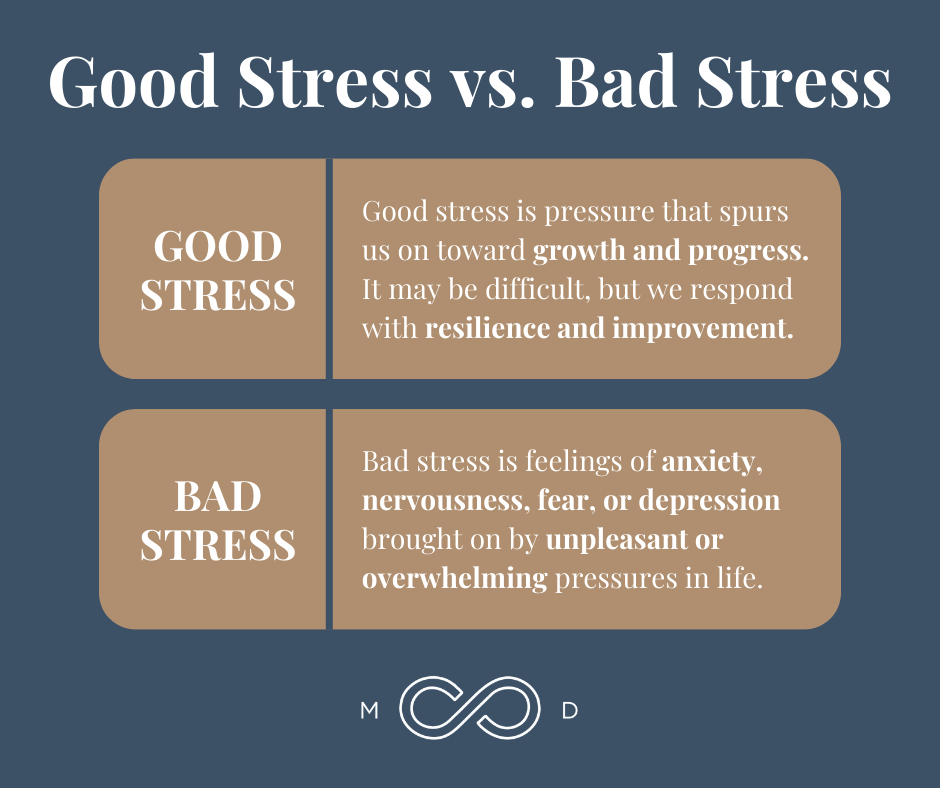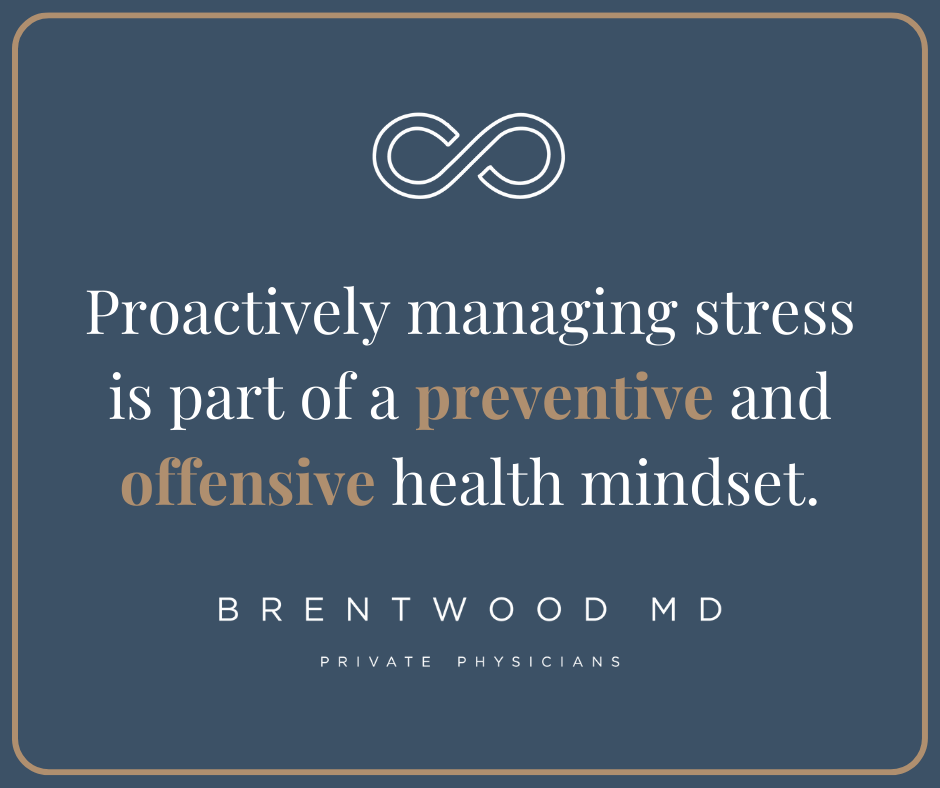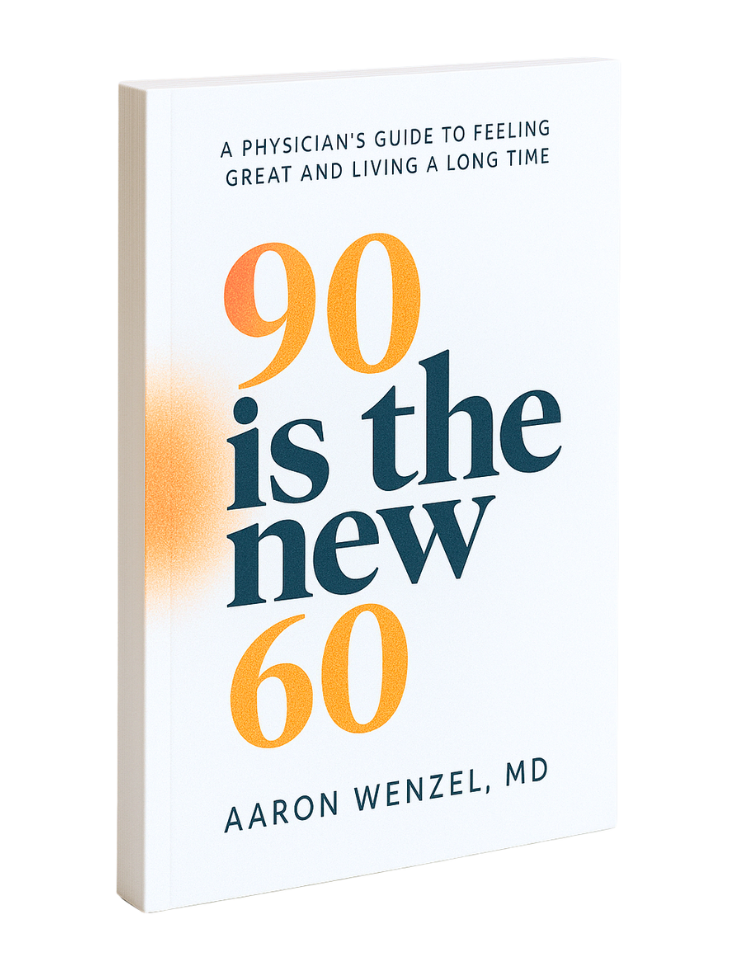It’s fascinating how we talk about stress in society today.
“I’m so stressed out.”
“I’m dealing with a lot of stress right now.”
“That was so stressful!”
Sound familiar? These types of phrases are embedded in our culture and are characteristic of the way we think and talk about stress. It’s all negative, all the time.
It’s time we reframe the conversation.
If we don’t reframe the way we look at stress, we’re really missing an opportunity to learn and grow. So in this article, we’re going to take a more factual approach to stress. We’ll explore good stress vs. bad stress and explain how to overcome the negativity that underlies our feelings toward stress so we can ultimately improve our health.
Is Stress Bad?
Stress is something we all deal with. Though we may be able to reduce unnecessary stressors, we can’t completely eliminate stress from our lives. The trick is learning how to manage it appropriately.
Managing stress is one of the five foundations of good health and, as such, we need to take it seriously. In fact, effective stress management is part of a wholesome, proactive health strategy.
DOWNLOAD OUR FREE EBOOK
Concierge Medicine is the future of healthcare.
Learn more about this refreshing alternative to traditional primary care, and decide if it's right for you.
Key Considerations to decide...
Is Concierge Medicine Right for You?
Discussing stress and stress management has a very appropriate place in primary care, including here at Brentwood MD, because stress isn’t just an emotion. Stress has very real physical consequences.
Unmanaged stress invades our mental and physical health and has longstanding complications. For example, one of the most common initial symptoms of unmanaged stress is poor sleep quality. Let’s follow that thread.
Ongoing poor sleep affects energy, hormone levels, and the body’s healing and recovery processes. Continued high stress can elevate cortisol levels and lead to blood sugar alterations, a distinct risk factor for metabolic diseases like diabetes. Metabolic disease, especially diabetes, then becomes a risk factor for the top killers of humans, including heart disease, cancer, and dementia.
Clearly, stress is a serious matter, and prolonged stress has legitimate health consequences you can’t ignore.
Proactively managing stress is part of a preventive and offensive health mindset.
Defining Stress: Good Stress vs. Bad Stress
This differs from our cultural norms, but I like to define stress as just an external pressure placed on oneself, whether that be physical, emotional, or mental.
One way to think about stress is in terms of “good stress” vs. “bad stress.” This is an eye-opener for many, since we typically mention stress only with a negative connotation.
Bad stress in this context is probably fairly obvious: feelings of anxiety, nervousness, fear, or depression brought on by unpleasant or overwhelming pressures in life.
Good stress, though, is pressure that pushes us toward growth and progress. It may be difficult, but we respond with resilience and improvement.
What marks the difference between good stress vs. bad stress, at least in many cases, isn’t so much the source of the stress as it is our mindset about stress.
A New Way to Think About Stress
To reframe our thoughts about stress, I find it helpful to also distinguish elective stress vs. involuntary stress.
Elective stress is stress you choose. It might be from a challenging new strength training regimen or a nutritional change, and it often yields positive results for your physical and mental health. And, yes, elective stress often correlates with the “good” stress mentioned above.
Involuntary stress is stress you do not choose but experience anyway. It might stem from the loss of a family member, a job change, or the challenges that come with parenting. It’s tempting to automatically lump involuntary stress in with “bad” stress, but this is where a radical thought shift can help.
What makes stress good or bad? Regardless of the origin of the stress, the result may have the potential to be profoundly positive. Our response to the stressor directly impacts this outcome.
To me, good stress is anything that can yield a positive result for your health, whether mental or physical. Certainly, elective stress qualifies as you willingly take on physical and mental challenges that result in benefit. But what if we could develop a good response to involuntary stress, as well?
It turns out that you can co-opt bad stress to work for you.
Turn Bad Stress Into Good Stress
As we work on a stress management plan, I help my patients use their involuntary stressors as learning opportunities. They observe how their bodies respond to bad stress and their natural inclinations for what comes next. This can steer you toward healthier and more appropriate responses to future involuntary stress.
For example, one common involuntary stress is work-related stress. When a person is asked to give more time and energy to work, it can lead to a cascade of negative consequences, including shorter sleep duration, poor sleep quality, and changes in relationships.
Our natural coping mechanisms aren’t always healthy, either, which can compound our stress. An overworked person might find it easy to indulge in late-night snacking and alcohol, or might start skipping the gym in the mornings because of their busyness.
To take control of the stress, I encourage my patients to name the ways negative stress affects them. Are they tired and crabby from poor sleep? Are they sacrificing self-care, such as exercise or nutritional planning?
By recognizing and naming the negative ways a stressor is affecting you, you have the opportunity to address those consequences with greater clarity and energy.
For example, if you identify that stress has disrupted your workout routine, you can recall that exercise actually helps your body cope with the effects of stress. Then you can choose to protect regular exercise as a crucial part of your daily itinerary. Similarly, while it can be difficult to prioritize eight hours of sleep every it night, adequate sleep leads to greater productivity and mental clarity.
When you clearly identify the benefits of certain healthy habits and anchor to them, you’re better able to protect and prioritize those habits in the face of involuntary stressors. Similarly, when you recognize certain natural tendencies toward unhealthy coping mechanisms and their consequences, you’re better able to reject them in the future.
At the end of the day, you can’t control what stress comes your way. But you can become intentional about your response.
Good Stress vs. Bad Stress: Final Thoughts
Stress is a part of life. You can love your family, your job, your town, and all your friends… but they’re still going to cause you stress. And that’s okay. In fact, it’s inevitable.
What you can control is your response, your mindset. By identifying your tendencies and anchoring yourself to healthy habits, you can reduce the negative effects of stress on your mind and body, ultimately turning bad stress into good.

Dr. Wright joined Brentwood MD in 2022 as the model allows him to spend more time connecting with patients and build a foundation of exceptional care. He is a Nashville native and completed his family medicine residency at the University of Tennessee Health Science Center, where he also served as Chief Resident. He believes that your health deserves a prominent position on your priority list, and would be honored to serve you and your family.










